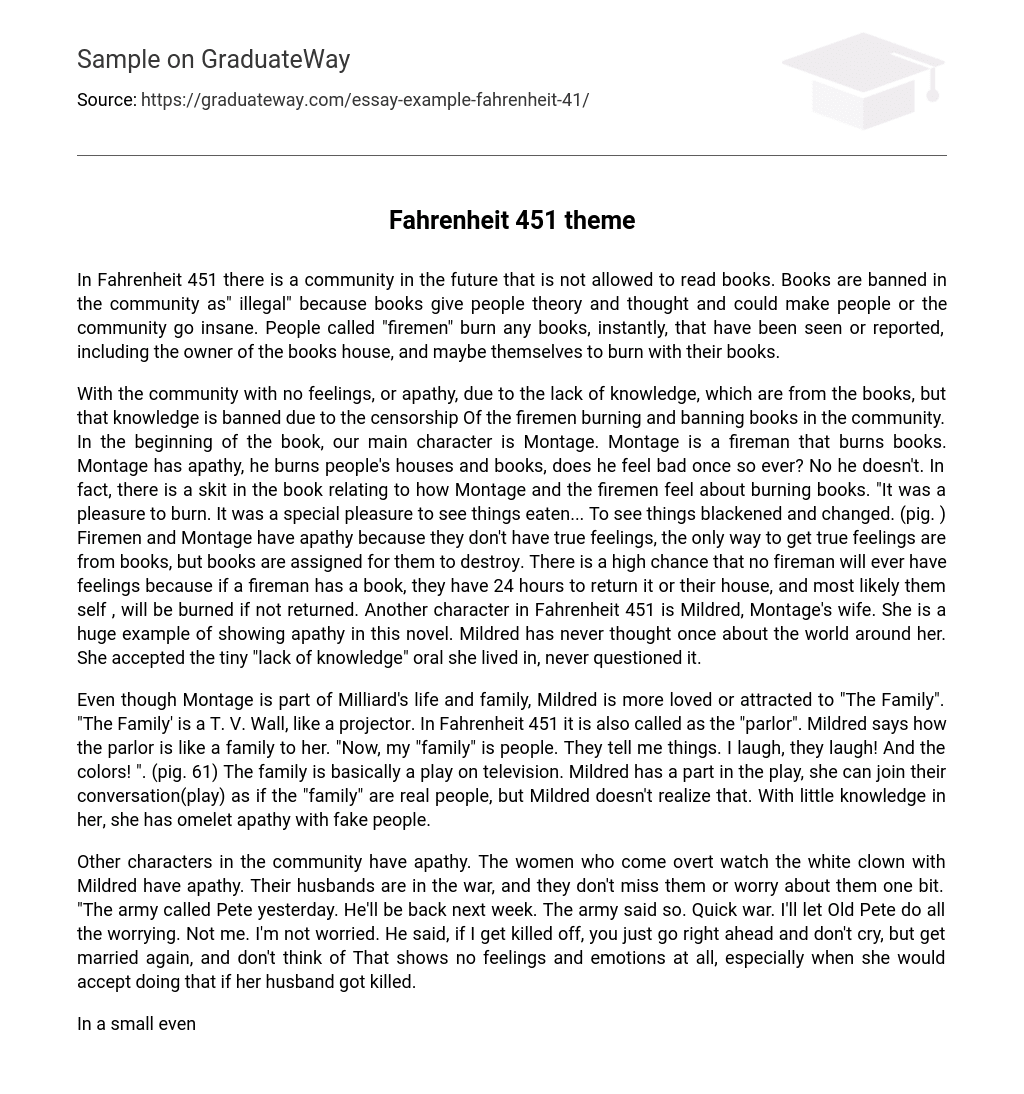In the dystopian world of Fahrenheit 451, the community of the future faces a strict ban on reading books. Books are considered “illegal” as they have the power to introduce theory and provoke deep thoughts, potentially leading individuals or the entire community into madness. Known as “firemen,” these individuals are assigned to burn any books they come across without delay. Their duty includes burning not only the books but also the houses of those found in possession of them, possibly even sacrificing themselves alongside their beloved books.
The community lacks knowledge and feelings due to censorship by the firemen who burn and ban books. The main character, Montage, is a fireman who has no remorse for burning houses and books. He even finds pleasure in it, as described in a skit where Montage and the firemen express their pleasure in seeing things burned and changed. The firemen and Montage lack true feelings because they are deprived of knowledge that can only be obtained from books, which are assigned to them for destruction. If a fireman possesses a book, they have 24 hours to return it, or their house and possibly themselves will be burned. Another character in the novel is Mildred, Montage’s apathetic wife, who never questions the world she lives in.
Even though Montage is a part of Milliard’s life and family, Mildred is more emotionally connected to “The Family”, which is a TV wall resembling a projector. In Fahrenheit 451, it is also referred to as the “parlor”. Mildred describes how the parlor serves as a substitute family for her, saying “Now, my ‘family’ is people. They tell me things. I laugh, they laugh! And the colors!” (pg. 61). Essentially, the family represents the world presented on television. Mildred actively engages with this world, participating in conversations as if the characters on the screen are real people. However, she fails to realize that these people are mere illusions, resulting in her apathetic attachment to fictional individuals.
Other members of the community also display apathy. The women who observe Mildred and the white clown exhibit apathy. Their husbands are away at war, but they do not feel any sense of longing or concern for them. One woman casually mentions that her husband, Pete, will be returning next week as the army has assured her it is a quick war. She declares that she is not worried about Pete’s safety and places all the responsibility of worrying on him. She even states that if he were to die, she would not shed a tear but instead encourage her to remarry without any hesitation. This attitude demonstrates a complete lack of emotions and feelings, particularly considering she is willing to act upon such insensitive thoughts if her husband were to meet an unfortunate fate.
Montage narrowly avoided being hit by a car in a small event that occurred in Fahrenheit 451 (pg. 124-125). What’s interesting is that it wasn’t the police chasing him down, but rather a group of teenagers who intentionally wanted to run him over.
The fact that these teenagers intended to harm and then flee the scene is quite uncommon, showing their lack of concern for running someone over and potentially causing their death.
This incident serves as a strong reminder of how such indifference can result in tragic consequences, just like when Clarisse was fatally struck by a car at the beginning of the story.
If one wants to challenge this apathy in society, there is one simple solution – read books.
Throughout Fahrenheit 451, certain characters display a lack of indifference or become “anti-indifferent” as the story unfolds. One such character is Claries, who genuinely experiences emotions and feelings unlike many others in their indifferent society. Claries stands out due to her unconventional nature, primarily because of her profound thoughts and emotions that surpass those of everyone else. What sets her apart even more is her insatiable curiosity and constant pursuit of knowledge through numerous questions she asks. Many instances demonstrate her uniqueness; fearlessly interacting with firemen, whom society fears, providing historical facts, and questioning what lies ahead. Undoubtedly, Claries proves to be an extraordinary individual.
Through discussions with Clarisse, Montag becomes more aware of his surroundings. This is evident when, while in the firehouse, he asks his colleagues, “Once upon a time, did firemen long ago stop fires, not start them?” (pig. 3). Later in the story, after realizing Clarisse’s death, Montag is shocked and deeply misses her. This leads him to become unhappy and turn to books for solace and a deeper understanding of true happiness and emotions. Through Montag’s reading, it becomes evident that he owns numerous books. He starts questioning why firemen burn books when they hold the key to solving problems. This realization causes Montag to develop a distaste for his job.
After overdosing with Millie, he realizes his lack of knowledge about her and undergoes a complete transformation. Along his journey, he encounters a professor named Faber, who is an avid reader. Collaborating with Faber, they defeat the firemen and leave the community behind forever. They are aware of the community’s descent into chaos and war, as it is ultimately destroyed by a nuclear or atomic bomb. Montage possesses the knowledge from the books and is able to share it with former book readers who are now considered criminals. Finally, Montage finds himself in a world where he truly belongs. Apathy, which is commonly understood as a lack of emotions, interests, and concerns, is defined.
Apathy, the suppression of emotions and lack of interest or concern about various aspects of life and the world, can be broken through by books according to the novel Fahrenheit 451. In today’s society, apathy is a widespread issue that leads individuals devoid of feelings to self-harm or engage in harmful actions. To conquer apathy, reading a book or setting personal goals can be attempted. Rather than being different from others, one should strive to be outgoing and embrace their true self!





